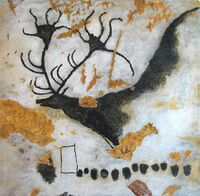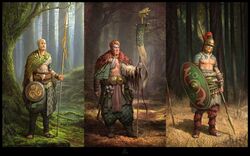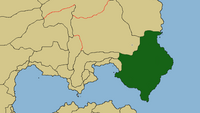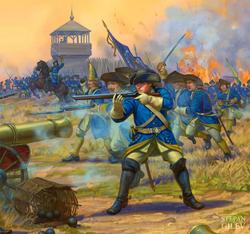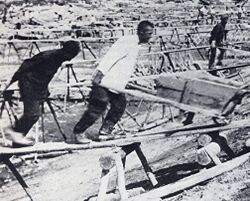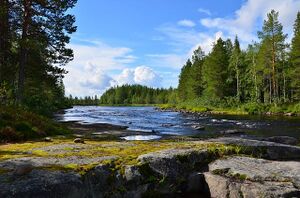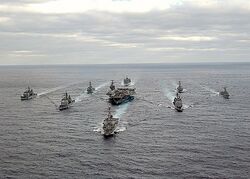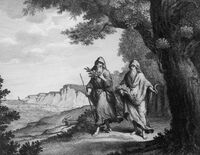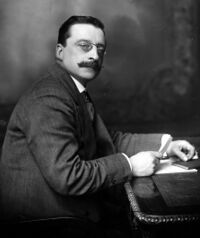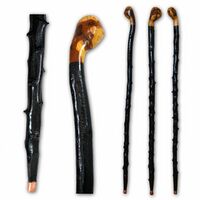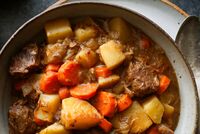Dau Sel: Difference between revisions
Thedawesome (talk | contribs) m (→Geography) |
Thedawesome (talk | contribs) |
||
| Line 212: | Line 212: | ||
{| class=wikitable style=text-align:right | {| class=wikitable style=text-align:right | ||
!Party | !Party | ||
!Abbreviation | |||
!Leader | !Leader | ||
!Ideology | !Ideology | ||
!Seats in the Teach Na Ionadaithe | !Seats in the Teach Na Ionadaithe | ||
|- | |- | ||
|align= | |align=center |'''Government'''|||||||| '''224''' | ||
|- | |- | ||
|align=left|{{colorbox|Blue}} [[List of political parties in Dau Sel|Socialist Democracy Party]] | |align=left|{{colorbox|Blue}} [[List of political parties in Dau Sel|Socialist Democracy Party]]<br><small>''Páirtí Daonlathais Sóisialaí''</small>||PDS||Effie Muirenn||decentralization, pro-west||162 | ||
|- | |- | ||
|align=left|{{colorbox|Yellow}} [[List of political parties in Dau Sel|Liberal Party]] | |align=left|{{colorbox|Yellow}} [[List of political parties in Dau Sel|Liberal Party]]<br><small>''Páirtí Liobrálach''</small>||LIOB||Armas Eva||decentralization, social liberalism||23 | ||
|- | |- | ||
|align=left|{{colorbox|Red}} [[List of political parties in Dau Sel|International Workers Party]] | |align=left|{{colorbox|Red}} [[List of political parties in Dau Sel|International Workers Party]]<br><small>''Páirtí Idirnáisiúnta na nOibrithe''</small>||PIO||Hildegard Åse||internationalism, syndicalism||20 | ||
|- | |- | ||
|align=left|{{colorbox|Brown}} [[List of political parties in Dau Sel|Dau Selan Naturalist Party]] | |align=left|{{colorbox|Brown}} [[List of political parties in Dau Sel|Dau Selan Naturalist Party]]<br><small>''Páirtí Nádúraí''</small>||NÁD||Benjamín Somerled||environmentalism, internationalism||19 | ||
|- | |- | ||
|align= | |align=center |'''Opposition'''|||||||| '''215''' | ||
|- | |- | ||
|align=left|{{colorbox|Green}} [[List of political parties in Dau Sel|Revolutionary Socialist Party]] | |align=left|{{colorbox|Green}} [[List of political parties in Dau Sel|Revolutionary Socialist Party]]<br><small>''Páirtí Sóisialach Réabhlóideach''</small>||PSR||Gilroy Thore||centralization, anti-west||146 | ||
|- | |- | ||
|align=left|{{colorbox|White}} [[List of political parties in Dau Sel|Traditionalist Party]] | |align=left|{{colorbox|White}} [[List of political parties in Dau Sel|Traditionalist Party]]<br><small>''Páirtí Traidisiúnta''</small>||TRAID||Niilo Aki||social conservatism||39 | ||
|- | |- | ||
|align=left|{{colorbox|Orange}} [[List of political parties in Dau Sel|United People's Party]] | |align=left|{{colorbox|Orange}} [[List of political parties in Dau Sel|United People's Party]]<br><small>''Páirtí an Phobail Aontaithe''</small>||PPA||Seán Tero||foreign aid, interventionism||19 | ||
|- | |- | ||
|align=left|{{colorbox|Pink}} [[List of political parties in Dau Sel|Families of Dau Sel]] | |align=left|{{colorbox|Pink}} [[List of political parties in Dau Sel|Families of Dau Sel]]<br><small>''Teaghlaigh Dæsala''</small>||TEAG||Torild Sari||social conservatism, ruralism||6 | ||
|- | |- | ||
|align=left|{{colorbox|Black}} [[List of political parties in Dau Sel|Fár Dúchai | |align=left|{{colorbox|Black}} [[List of political parties in Dau Sel|Our Homeland]]<br><small>''Fár Dúchai''</small>||FD||Aislinn Muirenn||social conservatism, nationalism, right wing populism||5 | ||
|- | |- | ||
|align= | |align=center |'''Total'''|||||||| '''439''' | ||
|} | |} | ||
Revision as of 12:45, 10 September 2021
This article is incomplete because it is pending further input from participants, or it is a work-in-progress by one author. Please comment on this article's talk page to share your input, comments and questions. Note: To contribute to this article, you may need to seek help from the author(s) of this page. |
Socialist Republic of Dau Sel Poblacht Shóisialach na Dæsala | |
|---|---|
| Motto: Rath trí antacht, antacht trí seirbhei Prosperity through unity, unity through service. | |
| Anthem: Dor Mo Dúchai "For My Homeland" | |
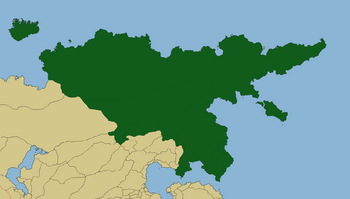 | |
| Capital | Príombar |
| Official languages | Gallán |
| Recognised regional languages | Pritonan Äidinkieli Kira Spræki |
| Ethnic groups (2017) | Gallán Dau Selan 76.63% Other Dau Selan 15.15% Other 8.22% |
| Demonym(s) | Dau Selan |
| Government | Unitary Parliamentary Socialist Republic |
• Prime Minister | Effie Muirenn (SDP) |
| Formation | |
• High Chiefdom of Dúchai | 872 |
• Kingdom of Dau Sel | 1209 |
• Empire of Dau Sel | February 22, 1619 |
• People's Republic of Dau Sel | September 3, 1892 |
| Population | |
• 2021 census | 43,951,381 |
| Gini (2018) | 19.03 low |
| HDI (2018) | 0.922 very high |
| Currency | Dolal (DAL) |
| Date format | ddmmyyyy |
| Driving side | right |
| Calling code | +66 |
| ISO 3166 code | DS |
| Internet TLD | .ds |
Dau Sel (Gallán: Dæsala), officially The Socialist Republic of Dau Sel, is located in the northeast of Nori within the region of Greater Olympus. It has a population of approximately 44 million across its 14 provinces. It is bordered by Xerishahr to its west, the Jabféta Sea to it's north, the Éndalus Ocean to its east, and the Uscímóra Sea to its south. It's capital city is Príombar which lies in the far south, along the coast of the Éndalus Ocean. Other notable cities include Craín, Glarí, and Cranísa.
Name
The exact origins for the name Dau Sel are unclear though there are several theories as to where the name could have originated. Dau Sel does exist as a term in an offshoot of Old Gallán meaning "two seals", however, this particular branch of Old Gallán was not widely spoken and the words dau sel did not appear until after other languages had already developed similar words for the region. Older claims include the word Døsæl meaning "dove seal" in traditional Säti and Déisala meaning "good/bountiful land" in Old Gallán.
History
Pre-History
The earliest known inhabitants of Dau Sel are the Eilec culture of approximately 20,000 years ago. Not much is known of these people other than their veneration of the native giant elk. The only evidence remaining of the Eilec are a collection of preserved cave paintings in southern Dau Sel as well as a handful of burial sites. It is believed that these early inhabitants pushed northeast over several thousand years likely searching for new sources of food. Over time the inhabitants of this vast expanse would diverge into the precursors to the modern Säti and Kiranian peoples, with the latter continuing on across the then exposed land bridge with Storsnia to settle there as well.
Warring Clans Period
Prior to the unification of Dúchai there is not much known about the region but from what records do survive it appears the land was divided into a collection of warring clans, hence the name of the warring clans period. There are some records starting around the year 700 which speak of a great warrior by the name of Chief Mórríghan, though they claim she lived much earlier, perhaps around 550. Mórríghan was described as being as tall as a man and twice as strong. Her dark hair hung down past her waist. She spoke with a voice that could shape the mountains and wielded a sword made of solid obsidian. Supposedly she was undefeated in battle for over 20 years until she was betrayed by someone close to her and led into an ambush. It is difficult to tell how much, if any, truth there is with these tales though there later was a Ó Mórríghan dynasty that claimed to trace their ancestry back to this fabled hero.
High Chiefdom of Dúchai
Many of the southeastern provinces of Dau Sel, then referred to as Dúchai, were first united by Fáelán Ó Áedh, Chief of Príomhaire (which would later be renamed Príombar) in 872 when he defeated Chief Conlaoch of Feirmthoir. This marked the end of the warring clans period in Dau Sel. Ó Áedh was dubbed the first High Chieftain of Dúchai and became the founder of the Ó Fáelán dynasty who would rule for over a century. 3 years later Fáelán would die in battle and be succeeded by his son, Fionnlagh Ó Fáelán. Despite centuries of searching, it is unknown where Fáelán was buried.
Over the following centuries the High Chiefdom would go on to conquer its tribal neighbors to the west including Foscadh, Croílár, Noic Glasa, and Oileánthas. The raiding bands of warriors from the northern Pritocpan lands were a constant danger at the time and starting in the early 10th century raiders from Heimströnd would terrorize the northeastern coast.
Kingdom of Dau Sel
By the early 13th century the High Chiefdom of Dúchai had grown to include many of the surrounding chiefdoms. In order to reflect this expansion and the increased government centralization then High Chieftain Bradán Ó Conchobar declared himself the first King of Dau Sel. At this point the term Dau Sel had come to refer to the greater area around Dúchai.
In 1297 Flæmingr Arnþórr of Heimströnd lead an invading force of several thousand into the heart of Dau Sel, capturing the capital. Arnþórr then declared himself King of Dau Sel. He held this title for 32 years before being overthrown. A relative of the previous king was then declared the new King of Dau Sel. It is debated whether or not Arnþórr counts as an official King of Dau Sel.
In 1413 there was a succession crisis within Dau Sel when King Máedóc II died at the age of 33 without leaving a male heir. To prevent a war of succession King Máedóc's family agreed to have the king's eldest daughter Aoife marry King Eoghan of Pritfear, uniting the two realms.
Over the following 2 centuries Dau Sel would gradually push its border northwards.
Empire of Dau Sel
Once the northward expansion into Kiranian land was completed The Kingdom of Dau Sel had grown to cover an enormous expanse. On February 22, 1619, during the celebrations for a successful military campaign King Fearghal IV proclaimed himself Emperor of the newly created Empire of Dau Sel.
With the Dau Selan border now reaching the Jabféta Sea the nation switched their focus abroad. The next few decades saw an increased focus on warship production and the training of admirals. This strengthened navy helped strengthen exploratory efforts and Dau Selan trade influence in the Éndalus Ocean. One of the first major
In 1768 Empress Caoimhe I claimed the northern island of Jáma, then referred to as Bhad Thuaidh.
During the mid 19th century the empire began to further and further seclude itself from the rest of the world. This was likely done as a conscious decision by the ruling family to prevent the spread revolutionary ideas that were gaining traction in other parts of the world. This had the possibly unintended consequence of causing the nation to stagnate and fail to adopt many technological advances that had been developing at the time.
People's Republic of Dau Sel
In first half of 1887 Dau Sel was hit with a severe drought that drastically hampered the nation's agricultural output. At the time most Dau Selans worked on lands that were legally owned by wealthy elites in exchange for a fixed amount of crops that the owners would then sell for a profit. Due to the drought most were unable to make their required payments and those that were able to didn't have enough left over in order to support themselves or their families. As the field workers had little to no crops of their own to sell they had precious little to spend on necessities such as food. This caused local food prices to plummet. As a response the field owners opted to sell what crops they did have in foreign markets to try to get a higher price, greatly exacerbating what had become a nationwide food shortage. It was during the autumn of 1888 that large scale violence had officially erupted.
The militias were determined but could not match the fighting skill of the trained soldiers. To compensate the militias quickly switched to using guerilla tactics in order to pick off soldiers, disrupt supply lines, and hamper enemy morale. Small communities would often house informants for the militias, spreading word of troop movements and possible plans. During this period the militias began adopting a green flag as a symbol for their cause. On September 1, 1892 the Royalists officially surrendered to the People's Revolutionary Army. On September 3, 1892 the People's Republic of Dau Sel was declared and Cináed Donaghue was named the inaugural Prime Minister of the People's Republic.
Shortly following the surrender of the Royalists the provisional government enacted a series of policies that would lead to a period of time known as The Terrors. During this time royalist supporters, nobility, and those who spoke out against the revolution were rounded up and either executed or shipped off to prison labor camps in Dau Sel's rural Kiranian provinces. As this region was still very sparsely inhabited and lacked infrastructure many prisoners were tasked with felling trees and creating dirt paths deep into the wilderness. Many died due to exhaustion and dehydration. When arriving at the locations for the camps the prisoners were once again tasked with clearing the land. Security in these camps was minimal as the vast expanses of wilderness and freezing winter temperatures were strong enough to deter most from leaving the camp. It is estimated that by 1905 the Dau Selan population had fallen from approximately 45,000,000 in 1885 to just 33,000,000 due to a mix of famine, emigration, and violence. As of 2021, the population has still not reached pre-1887 levels.
As power was being solidified the main focus of governance was the matter of food security. The provisional government enacted sweeping agricultural reforms that included land redistribution and major restrictions on the exporting of food. As these restrictions made it near impossible to sell food on the international market and domestic prices were too low to turn a profit, many farmers converted excess crops into alcohol. The alcohol industry was far less regulated than the food industry allowing vodka, beer, and lingonberry wine distilleries to pop up and become incredibly popular. This would mark the beginning of Dau Sel's history with alcoholism. Alcoholism rates rose steadily until around 1920 when they plateaued and essentially remained constant until the reconstruction in 1988. It is believed that cheap alcohol and a lack of alternative entertainment led to these high rates. Alcoholism has been steadily declining since major industry reforms in 1990. Higher taxes on alcohol has led to many farmers to instead switch focus to producing livestock feed instead of crops for alcohol, though there is still a substantial alcohol industry.
As the RSP was working to ensure food security for the nation increasing output became a major focus. It was decided that some of the vast swathes of untouched wilderness in Dau Sel's north would be the site of some of the new state run farms. Like the work camps, these too would initially be established and run by prison labor, however, as years passed and prisoner numbers decreased these farms transitioned to being operated by citizens shipped in from other regions.
Oil was first discovered in Dau Sel in 1914 by a work crew clearing land. This led to an explosion of interest in the northern reaches of the country. State survey crews were dispatched all across the region to asses the size of the nation's oil reserves. Over the next few decades land would be cleared and more roads would be made to establish oil wells and transport the crude oil closer to the nation's trade hubs. Prior to the discovery of oil the northern region's remoteness was considered an asset but now it was severely hampering production. In order to boost the burgeoning oil industry in the nation, and assist with agricultural output in the region, then PM Allan McAfee tasked the nation's engineers with establishing a system of rail to connect all regions. It was important that this system would function for both freight and passenger use as transporting laborers to the northern farms had been an issue since their creation.
Socialist Republic of Dau Sel
By the mid 1980s support for the government had reached its lowest point since the revolution. As unrest grew, Prime Minister Fionn Thorstein felt that something drastic would have to happen to prevent complete revolt. On May 14, 1988 Thorstein implemented An Scail (The Opening) greatly reducing press censorship, promoting government transparency, and legalizing opposition parties. To coincide with this opening of the political process elections were scheduled for August 1 of that year. The RSP subsequently lost control of the Reonadaí Hach to the new Socialist Democracy Party (SDP). On September 1 of 1988 Brigid Ó Coaglin was sworn in as the first non-RSP Prime Minister of Dau Sel.
The SDP passed major reforms in the autumn of 1988 known as An Atógal (The Reconstruction). These reforms included significant reworking of the political and economic systems, officially changing the name of the country to The Socialist Republic of Dau Sel, and changing the flag to the current striped version. The Reconstruction was broken into 9 sections which are referenced in the 9 stripes added to the old green banner.
In addition to domestic reforms, the SDP sought to change the nation's foreign policy, opening up relations with western powers. Many within the party wanted to warm the chilly relations that Dau Sel had with most western nations since the end of the revolution in 1892. This was a somewhat controversial move domestically as many still held antagonistic views towards the west. These relations, along with the economic restructuring, led to many foreign consumer goods flooding Dau Selan markets. Consumers loved this abundance of choice while producers were frequently driven out of business by cheaper or superior imports.
While the RSP technically survived as a party during this period, they did not hold power and faced a serious dilemma regarding what party politics were going to look like going forward. Many of the older party hardliners sought to regain power and undo all the changes enacted by Thorstein and the SDP, returning the country to a single party state. Many of the younger party members either disagreed with this goal or realized it was hopeless and instead argued for rebranding, coalition building, and policy restructuring. This conflict led to the RSP suffering another humiliating loss to the SDP in the elections of 1992. At this point it appeared that the SDP was the only major party and could only be unseated by a broad coalition of many separate parties.
In 1994 the RSP was being unified under the leadership of Leary Ó Flannagáin, a representative from Feirmthoir. Ó Flannagáin argued for strongly criticizing failures in SDP policies, emphasizing patriotism and nostalgia, and working with other conservative leaning parties. In the 1996 elections the RSP picked up 23 seats, mostly taken from the SDP. Prior to the election, there was a small contingency of older RSP members who did not agree with this new direction and subsequently ran under the newly created People's Socialist Party. The PSP failed to pick up any seats in the 1996 election. This is considered the final death knell for the old RSP.
In January, 2020 the nation was hit by the Global Recession.
Geography
Climate
The southern reaches of Dau Sel experience the warmest weather of the country, being classified as having a continental climate. This leads to hot summers, mild springs and autumns, and cold winters. Further north lie the highlands of south central Dau Sel. These regions are notably colder due to being further north and the increased elevation. Further north lie the large expanses of taiga. Despite being so far north, these regions too experience warm, although brief, summers. In Dau Sel's most northern reaches are the polar regions. These areas frequently feature below freezing temperatures and severe winds.
Biodiversity
Dau Sel is largely divided into three major biomes; the temperate deciduous forests of the south, the northern taiga, and the far northern tundra. Additionally there are also the central highlands, the northern polar region, and the coastal regions along the south, east, and north.
Located in the far south of Dau Sel lies the country's temperate deciduous forests. This region is defined by its trees that lose their leaves each autumn and regrow them the following spring. Though this region features the largest temperature swings of the three major regions the average temperature is much warmer than in the others allowing for better growing conditions for crops. Some of the animals native to Dau Sel's temperate deciduous forests include elk, red deer, grizzly bear, common raven, red fox, wren, and spotted owl.
Making up a majority of the land area within Dau Sel, the nation's taiga region is known for it's mostly undisturbed forests of pines, spruces, and larches. While the temperature tends to be quite a bit colder than in the south this region does still experience warm summers. Some of the animals native to Dau Sel's taiga include moose, reindeer, giant elk, common raven, grizzly bear, grey wolf, red fox, red deer, red squirrel, beaver, and lynx. Despite being synonymous with the region, the giant elk was declared to be a vulnerable species in 1993 due in large part to destruction of natural habitat. This lead to the creation of several new national parks within the elk's historic range. Strict conservation efforts have seen numbers begin to rebound leading to the giant elk being upgraded to near threatened in 2015.
The far northern reaches of Dau Sel are home to the country's tundra region. Being the coldest and least hospitable, this region is home to the smallest variety of plants and animals. Some of the animals native to Dau Sel's tundra include polar bear, arctic fox, and reindeer
Politics
The government of the Socialist Republic of Dau Sel is divided into three branches; the executive, the legislative, and the judicial. The executive branch is headed by the Cænír (Prime Minister) who is the head of the majority party. The legislative branch is broken into the Teach Cúige (Provincial House) and the Teach Na Ionadaithe (House of Representatives). The judicial branch is headed by the Hoffcuírt (Supreme Court).
The executive branch is headed by the Prime Minister who is the party leader of the ruling party in the House of Representatives. The current Prime Minister of Dau Sel is Effie Muirenn of the Socialist Democracy Party. The Prime Minister is primarily tasked with assembling a cabinet to exercise the law and acting as commander in chief. The Prime Minister is allowed to serve so long as they are the head of their party and their party maintains their position within the House of Representatives. The Prime Minister can be removed via a vote of no confidence within the House of Representatives.
The legislative branch of Dau Sel is comprised of the Provincial House and the House of Representatives. The House of Representatives is comprised of 439 elected representatives in a proportional representation system where seats are allotted to the various parties based on what percentage of the total vote they received. The Provincial House is comprised of 447 elected representatives, each representing their province. All elections are done with a system of approval score voting where each of the parties or candidates are given a score between 0 and 5 by the voters and the parties or candidates that receive the highest amount of favorability are elected. The Provincial House is not allowed to initiate a vote of no confidence, but they are allowed to propose laws. A vote of no confidence can only be proposed by the House of Representatives. The Provincial House's main power is to vote on bills that have passed the House of Representatives, however, if a bill is voted down in the Provincial House the House of Representatives can overrule this decision with a 2/3 majority vote.
| Party | Abbreviation | Leader | Ideology | Seats in the Teach Na Ionadaithe |
|---|---|---|---|---|
| Government | 224 | |||
| Socialist Democracy Party Páirtí Daonlathais Sóisialaí |
PDS | Effie Muirenn | decentralization, pro-west | 162 |
| Liberal Party Páirtí Liobrálach |
LIOB | Armas Eva | decentralization, social liberalism | 23 |
| International Workers Party Páirtí Idirnáisiúnta na nOibrithe |
PIO | Hildegard Åse | internationalism, syndicalism | 20 |
| Dau Selan Naturalist Party Páirtí Nádúraí |
NÁD | Benjamín Somerled | environmentalism, internationalism | 19 |
| Opposition | 215 | |||
| Revolutionary Socialist Party Páirtí Sóisialach Réabhlóideach |
PSR | Gilroy Thore | centralization, anti-west | 146 |
| Traditionalist Party Páirtí Traidisiúnta |
TRAID | Niilo Aki | social conservatism | 39 |
| United People's Party Páirtí an Phobail Aontaithe |
PPA | Seán Tero | foreign aid, interventionism | 19 |
| Families of Dau Sel Teaghlaigh Dæsala |
TEAG | Torild Sari | social conservatism, ruralism | 6 |
| Our Homeland Fár Dúchai |
FD | Aislinn Muirenn | social conservatism, nationalism, right wing populism | 5 |
| Total | 439 |
The judicial branch is headed by the Hoffcuírt (Supreme Court). The Supreme Court is comprised of 9 judges. These judges are appointed by the Prime Minister and serve a life term unless they step down or are removed by the Representative House. The primary function of the Supreme Court is to interpret the law and the Constitution of the Socialist Republic of Dau Sel.
Local Governments
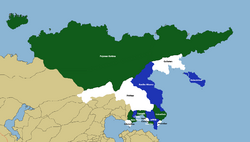
Dau Sel is divided into 14 provinces. The northern provinces are divided largely based along cultural lines while the southern provinces are largely divided based on historical borders. While most provinces have their borders defined by history a few are relatively new creations. For example, neither Gulksten nor Pojonen Kotima existed prior to 1902 when the current provincial system was implemented. Alternatively, both Pritfear and Heimströnd existed as independent kingdoms as far back as 1032. Because of this, the provinces of Dau Sel have significantly different sizes and populations numbers. For example, despite making up approximately 50% of all of Dau Sel's land area Pojonen Kotima is one of the least populated with only around 1.2 million residents. Alternatively, the comparably tiny province of Príombar has roughly four times as many citizens as Pojonen Kotima.
Law
Dau Sel has a civil law system with the Hoffcuírt weighing in on constitutional matters and judicial review. The current legal system in Dau Sel prioritizes rehabilitation with the ultimate goal of reforming prisoners to be productive members of society. Prisons usually feature classes and workshops designed to provide inmates with useful skills once they are released. The death penalty was outlawed in 1998.
Foreign Relations
After the establishment of the People's Republic of Dau Sel in 1892 many foreign powers refused to recognize the new government. Throughout the 20th century Dau Sel developed close ties with many other leftist governments and maintained an adversarial attitude towards the governments of capitalist or monarchist governments. Many of these countries welcomed emigrants from Dau Sel that were fleeing the turmoil from 1887 through the early 1900s. These populations were strongly opposed to this new government. International relations began to change after the reconstruction of 1988 as the Socialist Democracy Party sought to open up relations with the western world. This was a controversial move among the socialist bloc leading to some souring of relations.
During the early 20th century Dau Sel had particularly chilly relations with their neighbor to the east, Storsnia. The aristocratic government greatly disapproved of the violent populist movement in Dau Sel. Relations greatly improved in the 1940s when the Storsnian government was overthrown and replaced with a somewhat left leaning autocracy. Recent relations have been improving with the efforts of SDP governments.
Military
The Dau Sel armed forces are divided into Land, Sea, and Air Forces. The total number of those enlisted within the Dau Sel armed forces is approximately 400,000, a little below 1% of the national population. The Prime Minister is the Commander in Chief for the Dau Selan armed forces. Just below the Prime Minister in terms of command is the Minister of Defense, who is appointed by the Prime Minister.
Economy
The economy of Dau Sel is a mix of command and market, depending on the industry. Industries which the government deems vital to the nation are directly controlled and function under a command structure. Industries that do not have this designation are allowed to run independent of the government under a market socialist system where individual businesses have ownership shared amongst the workers and compete with other businesses in an open market. Some notable sectors within the Dau Selan economy include mineral extraction, energy, and agriculture. Dau Sel produce bauxite, iron, titanium, and sulfur mostly from mines located within the province of Pritfear leading to mining being one of the top occupations of the region.
Dau Sel has used the dolal as its currency since 1895. The dolal is a fiat currency
Agriculture and Fishery
Dau Sel's agricultural sector is strongest in Feirmthoir and Leithis where the growing of wheat and potatoes employs a plurality of its citizens. Feirmthoir also produces beef and dairy from the raising of cattle. The highland province of Pritfear also features the raising of the distinct highland cow.
Fishing is a major industry among much of Dau Sel's eastern coast, particularly within the island province of Heimströnd.
Trade
The main exports of Dau Sel include shipbuilding, iron, small arms, oil, and commercial shipping.
Dau Sel's main imports fall largely within the realm of consumer goods such as consumer electronics, personal vehicles, clothing, appliances, and beauty products. Since the opening of the economy in 1988 the consumer goods sector has grown substantially, however, domestic producers still frequently find themselves being outcompeted by foreign imports.
Energy
Dau Sel produces oil, natural gas, and coal. These resources exist largely within the province of Pojonen Kotima, in the far north of Dau Sel. This abundance of resources has allowed Dau Sel to sell off its surplus energy as well as export a significant amount of crude oil into the world economy.
Infrastructure
Dau Sel features international airports within the capital of Príombar as well as in Craín, Glarí, and Cranísa. These feature flights across Nori as well as to select destinations within Lira, Storsnia, Nezlotah, and Xotla. Many of these routes are serviced by Ær Dæsala (Dau Sel Air).
Rail services are provided by Iarnród Dæsala (Dau Sel Rail) which handles all intercity, commuter, and freight services within the country.
Demographics
Languages
The official language of Dau Sel is Gallán though the languages of Pritonan, Äidinkieli, Kira, and Spræki are recognized by the national government and are official languages in various provinces. Modern Gallán uses 20 letters (a b c d e f g h i j k l m n o p r s t u). The vowels may be accented as follows: á é í ó ú. This is done to place emphasis on the letter. O can also be accented with an umlaut to alter pronunciation. Traditional Gallán only uses 18 letters (a b c d e f g h i l m n o p r s t u), the additional 2 (j k) have been adopted over time from other Dau Selan languages, namely Äidinkieli, Kira, and Spræki. Additionally the character æ is used in modern Gallán however it is simply considered a combination of a and e rather than its own unique letter. It is believed that æ was the first character for Gallán speakers to adopt from another language, most likely coming from Spræki. Æ is written as ä in Äidinkieli and Kira.
Modern Gallán formed as Old Gallán simplified and integrated aspects of neighboring Dau Selan languages. Prictopan is closer to Old Gallán as it lacks many outside influences. Spræki has remained largely unchanged from its ancient roots, likely due to Heimströnd's geographic isolation. Äidinkieli and Kira both stem from Old Kira. Modern Kira is much closer to Old Kira as Äidinkieli has significant influences from both Spræki and Gallán.
Religion
A 2019 survey found that approximately 62% of Dau Selans follow the native Draoidheachd (Druidism), 17% follow no religion, and 21% follow various foreign religions.
Culture
Literature and Philosophy
Dau Selan philosophy has its roots in the druids who would act as spiritual leaders for tribes before the warring clans period. The druids were trusted as wise men and women who had a special connection with nature and the spiritual realm. Over the proceeding millennia the importance of these trusted individuals has maintained.
The most recent surge in Dau Selan philosophy occurred during the period of the Dau Selan Revolution. The most important of this group of philosophers was Cináed Donaghue, who would go on to become the first Prime Minister of the People's Republic of Dau Sel.
Music and Dance
Music has been an important part of life in Dau Sel for millennia. The earliest Dau Selan music known of was created using hide skin drums, bone flutes, and various other primitive instruments. During the warring clans period bardic tales of mighty heroes were commonplace.
During the reconstruction era of the late 80s through the early 90s Dau Sel saw an explosion of punk rock music tapping into the nation's collective frustration with the political system. This period saw the popularity of such bands as Brón Murphy, Lionndubh, and Bunúsach.
Customs and Holidays
Most holidays in Dau Sel originate from the predominant religion of Druidism. These holidays focus on the changing of the seasons and the importance of harvest. The major holidays within Dau Sel are Democracy Day on the first Monday in March, the Spring Equinox on March 21st, Bealtaine on May 1st, the Summer Solstice on June 21st, Lughnasa on August 1st, Revolution Day on September 3rd, the Autumnal Equinox on September 21st, and the Winter Solstice on December 21st.
It is customary for the leader of Dau Sel, a role currently occupied by the Prime Minister, to possess a sheleighly. Historically, this was just the private sheleighly of the individual but over time this transitioned to a ceremonial sheleighly handed down from one leader to the next. This practice has led to the expression "hold the sheleighly" which means to be in charge.
The giant elk has played a part in Dau Selan culture for millennia. According to Druidism the giant elks are servants of Danu and work to maintain the balance of nature. As such it is highly taboo to harm a giant elk. An old folk tale tells of a man who lived out in the woods that was visited by a giant elk and later killed it. For this he is punished by Danu. This has led to the expression "Don't kill the elk." meaning don't ruin something that is good for you.
Media
Craoladh Poiblí Dæsala (Dau Sel Public Broadcasting) is the public television and radio broadcasting organization. It includes the subsidiary stations of CPD1, CPD2, and CPD Jr. which specializes in children's programming. CPD1 features the nations most popular news program, An Lá Duit (The Day to You). CPD2 frequently features popular films, largely domestically produced but some international.
CPD also hosts the radio station Raidió Dæsala (Radio Dau Sel) which primarily covers weather, news, and sports.
The internet is classified as a public utility in Dau Sel and access is provided via the government operated Dæsala Ceangal (Dau Sel Connect).
Cuisine
Traditional Dau Selan cuisine typically features beef or fish, supplemented with potatoes, bread, carrots, or corn. Common dishes include various stews, chowders, and meat pies.
Popular beverages include tea, coffee, beer, and lingonberry wine.
Sports
One of the oldest sports in Dau Sel is the traditional Tilgeil which translates roughly to "throwing". It is a competitive sport between two participants fighting to toss the other out of the field of play. This is usually performed in a 20' diameter circle in a level field but may also be performed indoors on a thin mat. Modern Tilgeil features regulation athletic wear and rules regarding what contact is allowed but traditional Tilgeil was performed wearing only basic clothing and did not feature any restrictions on what the competitors could do to each other. The only restriction in traditional Tilgeil was that no weapons were allowed.


